#default behavior
Explore tagged Tumblr posts
Note
I've occasionally seen this common bug in several games where a character gets stuck in what seems to be the center of the map, doing a T pose. Is this is a common output of several different types of errors? If so, have you ever hidden the origin of the map under a hill, or made it hidden to the player somehow, so bugs like that are not spotted, even if they occur?

You're right - the T-pose (or its cousin the A-pose) is usually the default pose we put a model in when a particular pose or animation isn't working. The T-pose exists mostly because artists can see all parts of the model by rotating, moving, and zooming the camera, so they can fix up any odd texturing issues on the model.

The purpose of using the T-pose for the default is because it is instantly and visibly recognizable to just about anyone that it doesn't belong there. We often use things like a checkerboard pattern or bright magenta/cyan colors on a cube to indicate a missing model or texture so that the game doesn't crash when it's missing an asset, but QA can immediately flag it as not working properly or using a placeholder asset. As such, we don't want to hide them - we want them to be as visible as we can so that we can fix them.
[Join us on Discord] and/or [Support us on Patreon]
Got a burning question you want answered?
Short questions: Ask a Game Dev on Twitter
Long questions: Ask a Game Dev on Tumblr
Frequent Questions: The FAQ
29 notes
·
View notes
Text
thank you pinterest for launching me into yet another multiple day drawing :3

I LOVE HIIIIMAKAMSMSBDIHSSKBSDFHKJABSFD we know this
but oh my god this took almost 7 hours overall LMAO im so tired but like in a good way
you may be looking at his hair and saying “heyyyy gravity doesnt work that way….” in which case you are correct but i thought it would be cool if BEN’s hair kinda floats when he gets all glitchy like how hair does when it’s in water :3 in my head this would also mean it would poof up a little when he gets mad like in a ghibli movie or a cat bc…. cmon that’d be so fun
also idk what his outfit is i just improvised it bc i didn’t wanna design bro a whole outfit LMAO i never know what to draw him wearing!!!!! smh smh.. it’s okay he’s serving
but anyway…….. im so proud of this and how i did the shading hehe :333 i love him i love him i love him im so tired i love him
ref for the pose after the break if anyone wants it :D
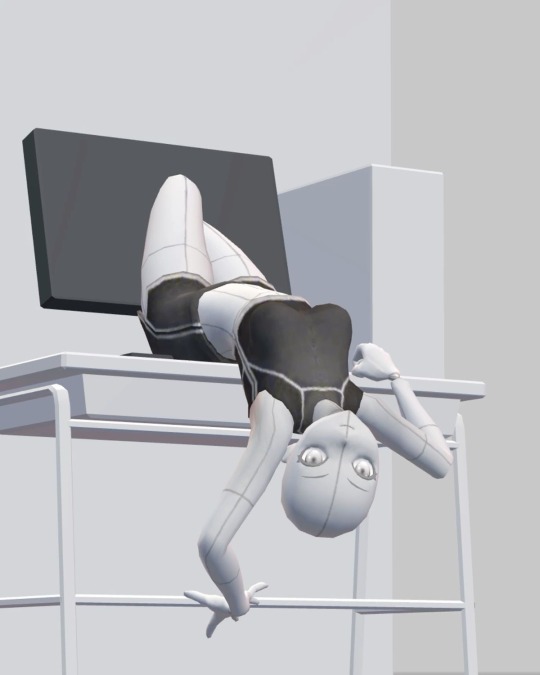
#did you guys know that i love him#art#small artist#digital art#artists on tumblr#my artwork#creepypasta fandom#creepypasta#creepypasta fanart#fanart#ben drowned#ben drowned fanart#behavioral event network#gay people can never enter a room normally#idk what the wires are there for i just thought it would be cool LMAO#plus adds some extra color >:3#i was supposed to finish this yesterday but didn’t hehe whoops#but its okay HE TURNED OUT GOOD ANYWAY RAHHHHHHH#i wanna like mess with his hair so i can watch it float around hehehehe#also introduction of his classic black and red eyes hehe#more like red and red actually LMAO but u get it#i mean he can do whatever he wants with his eyes i imagine#i just typically draw him with the red and white version bc that’s like… his default in my mind#i think ive yawned 20 times while making this post wow#its okay tho bc yk why….. :3#BC I LOVE HIIIIIIM AND I COOKED WITH THIS AND NOW i have another lovely drawing of my fav i can stare and smile at#need to draw him and slasher more inhad an idea for them earlier today….#yall ever watch donnie darko………. :3#also am i the only one as a kid that liked to lay like this on the couch so i could see the world upside down
213 notes
·
View notes
Text
the best stereotype to assign to toji is that he is the dude who is defensive about and honestly a little nerdy when it comes to grilling. he will guard that grill and he will deliver perfectly cooked hamburgers and steaks no you cannot help him and he knows he shouldn’t call it a “man’s job” but it’s his job and your job is to sit in the little beach chair he pulls out for you when it starts to get warm and sip your drink and keep him company and tell him what you think of the new spice rub he tried out and sure if you wanna kiss him on the cheek that's fine too he won’t object
#he does host the cookout and he has thrown beer at satoru for poking around the grill before#rip toji you would have LOVED a blackstone and also yuuji#i know that megumi brings home yuuji and toji LOVES him#it's just the two of them lifting cars and grilling burgers and doing insane labor together#while megumi sighs and pretends it doesn't make him happy#toji....... lazy domestic cat behavior SO real#also grill wife: nanami kento#i know the two of them love japanese barbecue... and absolutely do not let you cook the food#oh to have a man........ also ill put yuuta on that list but yuuta has an acts of service kink so hes there by default#toji x reader#💌
822 notes
·
View notes
Text
The paradox of choice screens
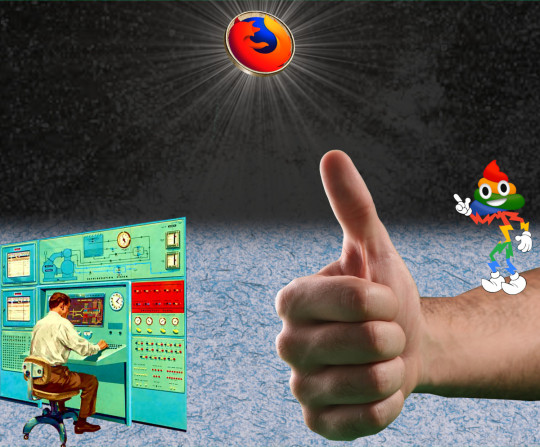
I'm coming to BURNING MAN! On TUESDAY (Aug 27) at 1PM, I'm giving a talk called "DISENSHITTIFY OR DIE!" at PALENQUE NORTE (7&E). On WEDNESDAY (Aug 28) at NOON, I'm doing a "Talking Caterpillar" Q&A at LIMINAL LABS (830&C).

It's official: the DOJ has won its case, and Google is a convicted monopolist. Over the next six months, we're gonna move into the "remedy" phase, where we figure out what the court is going to order Google to do to address its illegal monopoly power:
https://pluralistic.net/2024/08/07/revealed-preferences/#extinguish-v-improve
That's just the beginning, of course. Even if the court orders some big, muscular remedies, we can expect Google to appeal (they've already said they would) and that could drag out the case for years. But that can be a feature, not a bug: a years-long appeal will see Google on its very best behavior, with massive, attendant culture changes inside the company. A Google that's fighting for its life in the appeals court isn't going to be the kind of company that promotes a guy whose strategy for increasing revenue is to make Google Search deliberately worse, so that you will have to do more searches (and see more ads) to get the info you're seeking:
https://pluralistic.net/2024/04/24/naming-names/#prabhakar-raghavan
It's hard to overstate how much good stuff can emerge from a company that's mired itself in antitrust hell with extended appeals. In 1982, IBM wriggled off the antitrust hook after a 12-year fight that completely transformed the company's approach to business. After more than a decade of being micromanaged by lawyers who wanted to be sure that the company didn't screw up its appeal and anger antitrust enforcers, IBM's executives were totally transformed. When the company made its first PC, it decided to use commodity components (meaning anyone could build a similar PC by buying the same parts), and to buy its OS from an outside vendor called Micros-Soft (meaning competing PCs could use the same OS), and it turned a blind eye to the company that cloned the PC ROM, enabling companies like Dell, Compaq and Gateway to enter the market with "PC clones" that cost less and did more than the official IBM PC:
https://www.eff.org/deeplinks/2019/08/ibm-pc-compatible-how-adversarial-interoperability-saved-pcs-monopolization
The big question, of course, is whether the court will order Google to break up, say, by selling off Android, its ad-tech stack, and Chrome. That's a question I'll address on another day. For today, I want to think about how to de-monopolize browsers, the key portal to the internet. The world has two extremely dominant browsers, Safari and Chrome, and each of them are owned by an operating system vendor that pre-installs their own browser on their devices and pre-selects them as the default.
Defaults matter. That's a huge part of Judge Mehta's finding in the Google case, where the court saw evidence from Google's own internal research suggesting that people rarely change defaults, meaning that whatever the gadget does out of the box it will likely do forever. This puts a lie to Google's longstanding defense of its monopoly power: "choice is just a click away." Sure, it's just a click away – a click, you're pretty sure no one is ever going to make.
This means that any remedy to Google's browser dominance is going to involve a lot of wrangling about defaults. That's not a new wrangle, either. For many years, regulators and tech companies have tinkered with "choice screens" that were nominally designed to encourage users to try out different browsers and brake the inertia of the big two browsers that came bundled with OSes.
These choice screens have a mixed record. Google's 2019 Android setup choice screen for the European Mobile Application Distribution Agreement somehow managed to result in the vast majority of users sticking with Chrome. Microsoft had a similar experience in 2010 with BrowserChoice.eu, its response to the EU's 2000s-era antitrust action:
https://en.wikipedia.org/wiki/BrowserChoice.eu
Does this mean that choice screens don't work? Maybe. The idea of choice screens comes to us from the "choice architecture" world of "nudging," a technocratic pseudoscience that grew to prominence by offering the promise that regulators could make big changes without having to do any real regulating:
https://verfassungsblog.de/nudging-after-the-replication-crisis/
Nudge research is mired in the "replication crisis" (where foundational research findings turn out to be nonreplicable, due to bad research methodology, sloppy analysis, etc) and nudge researchers keep getting caught committing academic fraud:
https://www.ft.com/content/846cc7a5-12ee-4a44-830e-11ad00f224f9
When the first nudgers were caught committing fraud, more than a decade ago, they were assumed to be outliers in an otherwise honest and exciting field:
https://www.npr.org/2016/10/01/496093672/power-poses-co-author-i-do-not-believe-the-effects-are-real
Today, it's hard to find much to salvage from the field. To the extent the field is taken seriously today, it's often due to its critics repeating the claims of its boosters, a process Lee Vinsel calls "criti-hype":
https://sts-news.medium.com/youre-doing-it-wrong-notes-on-criticism-and-technology-hype-18b08b4307e5
For example, the term "dark patterns" lumps together really sneaky tactics with blunt acts of fraud. When you click an "opt out of cookies" button and get a screen that says "Success!" but which has a tiny little "confirm" button on it that you have to click to actually opt out, that's not a "dark pattern," it's just a scam:
https://pluralistic.net/2022/03/27/beware-of-the-leopard/#relentless
By ascribing widespread negative effects to subtle psychological manipulation ("dark patterns") rather than obvious and blatant fraud, we inadvertently elevate "nudging" to a real science, rather than a cult led by scammy fake scientists.
All this raises some empirical questions about choice screens: do they work (in the sense of getting people to break away from defaults), and if so, what's the best way to make them work?
This is an area with a pretty good literature, as it turns out, thanks in part due to some natural experiments, like when Russia forced Google to offer choice screens for Android in 2017, but didn't let Google design that screen. The Russian policy produced a significant switch away from Google's own apps to Russian versions, primarily made by Yandex:
https://cepr.org/publications/dp17779
In 2023, Mozilla Research published a detailed study in which 12,000 people from Germany, Spain and Poland set up simulated mobile and desktop devices with different kinds of choice screens, a project spurred on by the EU's Digital Markets Act, which is going to mandate choice screens starting this year:
https://research.mozilla.org/browser-competition/choicescreen/
I'm spending this week reviewing choice screen literature, and I've just read the Mozilla paper, which I found very interesting, albeit limited. The biggest limitation is that the researchers are getting users to simulate setting up a new device and then asking them how satisfied they are with the experience. That's certainly a question worth researching, but a far more important question is "How do users feel about the setup choices they made later, after living with them on the devices they use every day?" Unfortunately, that's a much more expensive and difficult question to answer, and beyond the scope of this paper.
With that limitation in mind, I'm going to break down the paper's findings here and draw some conclusions about what we should be looking for in any kind of choice screen remedy that comes out of the DOJ antitrust victory over Google.
The first thing note is that people report liking choice screens. When users get to choose their browsers, they expect to be happy with that choice; by contrast, users are skeptical that they'll like the default browser the vendor chose for them. Users don't consider choice screens to be burdensome, and adding a choice screen doesn't appreciably increase setup time.
There are some nuances to this. Users like choice screens during device setup but they don't like choice screens that pop up the first time they use a browser. That makes total sense: "choosing a browser" is colorably part of the "setting up your gadget" task. By contrast, the first time you open a browser on a new device, it's probably to get something else done (e.g. look up how to install a piece of software you used on your old device) and being interrupted with a choice screen at that moment is an unwelcome interruption. This is the psychology behind those obnoxious cookie-consent pop-ups that website bombard you with when you first visit them: you've clicked to that website because you need something it has, and being stuck with a privacy opt-out screen at that moment is predictably frustrating (which is why companies do it, and also why the DMA is going to punish companies that do).
The researchers experimented with different kinds of choice screens, varying the number of browsers on offer and the amount of information given on each. Again, users report that they prefer more choices and more information, and indeed, more choice and more info is correlated with choosing indie, non-default browsers, but this effect size is small (<10%), and no matter what kind of choice screen users get, most of them come away from the experience without absorbing any knowledge about indie browsers.
The order in which browsers are presented has a much larger effect than how many browsers or how much detail is present. People say they want lots of choices, but they usually choose one of the first four options. That said, users who get choice screens say it changes which browser they'd choose as a default.
Some of these contradictions appear to stem from users' fuzziness on what "default browser" means. For an OS vendor, "default browser" is the browser that pops up when you click a link in an email or social media. For most users, "default browser" means "the browser pinned to my home screen."
Where does all this leave us? I think it cashes out to this: choice screens will probably make a appreciable, but not massive, difference in browser dominance. They're cheap to implement, have no major downsides, and are easy to monitor. Choice screens might be needed to address Chrome's dominance even if the court orders Google to break off Chrome and stand it up as a separate business (we don't want any browser monopolies, even if they're not owned by a search monopolist!). So yeah, we should probably make a lot of noise to the effect that the court should order a choice screen, as part of a remedy.
That choice screen should be presented during device setup, with the choices presented in random order – with this caveat: Chrome should never appear in the top four choices.
All of that would help address the browser duopoly, even if it doesn't solve it. I would love to see more market-share for Firefox, which is the browser I've used every day for more than a decade, on my laptop and my phone. Of course, Mozilla has a role to play here. The company says it's going to refocus on browser quality, at the expense of the various side-hustles it's tried, which have ranged from uninteresting to catastrophically flawed:
https://www.fastcompany.com/91167564/mozilla-wants-you-to-love-firefox-again
For example, there was the tool to automatically remove your information from scummy data brokers, that they outsourced to a scummy data-broker:
https://www.theverge.com/2024/3/22/24109116/mozilla-ends-onerep-data-removal-partnership
And there's the "Privacy Preserving Attribution" tracking system that helps advertisers target you with surveillance advertising (in a way that's less invasive than existing techniques). Mozilla rolled this into Firefox on an opt out basis, and made opting out absurdly complicated, suggesting that it knew that it was imposing something on its users that they wouldn't freely choose:
https://blog.privacyguides.org/2024/07/14/mozilla-disappoints-us-yet-again-2/
They've been committing these kinds of unforced errors for more than a decade, seeking some kind of balance between monopolistic web companies and its users' desire to have a browser that protects them from invasive and unfair practices:
https://www.theguardian.com/technology/2014/may/14/firefox-closed-source-drm-video-browser-cory-doctorow
These compromises represent the fallacy that Mozilla's future depends on keeping bullying entertainment companies and Big Tech happy, so it can go on serving its users. At the same time, these compromises have alienated Mozilla's core users, the technical people who were its fiercest evangelists. Those core users are the authority on technical questions for the normies in their life, and they know exactly how cursed it is for Moz to be making these awful compromises.
Moz has hemorrhaged users over the past decade, meaning they have even less leverage over the corporations demanding that they make more compromises. This sets up a doom loop: make a bad compromise, lose users, become more vulnerable to demands for even worse compromises. "This capitulation puts us in a great position to make a stand in some hypothetical future where we don't instantly capitulate again" is a pretty unconvincing proposition.
After the past decade's heartbreaks, seeing Moz under new leadership makes me cautiously hopeful. Like I say, I am dependent on Firefox and want an independent, principled browser vendor that sees their role as producing a "user agent" that is faithful to its users' interests above all else:
https://pluralistic.net/2024/05/07/treacherous-computing/#rewilding-the-internet
Of course, Moz depends on Google's payment for default search placement for 90% of its revenue. If Google can't pay for this in the future, the org is going to have to find another source of revenue. Perhaps that will be the EU, or foundations, or users. In any of these cases, the org will find it much easier to raise funds if it is standing up for its users – not compromising on their interests.

Community voting for SXSW is live! If you wanna hear RIDA QADRI and me talk about how GIG WORKERS can DISENSHITTIFY their jobs with INTEROPERABILITY, VOTE FOR THIS ONE!

If you'd like an essay-formatted version of this post to read or share, here's a link to it on pluralistic.net, my surveillance-free, ad-free, tracker-free blog:
https://pluralistic.net/2024/08/12/defaults-matter/#make-up-your-mind-already

Image: ICMA Photos (modified) https://www.flickr.com/photos/icma/3635981474/
CC BY-SA 2.0 https://creativecommons.org/licenses/by-sa/2.0/
#pluralistic#choice screens#dma#eu#scholarship#ux#behavioral economics#mozilla#remedies#browsers#mobile#defaults matter#google#doj v google
204 notes
·
View notes
Text


hey. happy halloween. peterstakh vampire & vampire hunter couple costume, yes?

#my art#peterstakh#stanislav rubin#peter stamatin#peterstakhed to keep my mind off things... default behavior#pathologic#мор утопия#petya's immune to garlic. his father was italian.
590 notes
·
View notes
Text

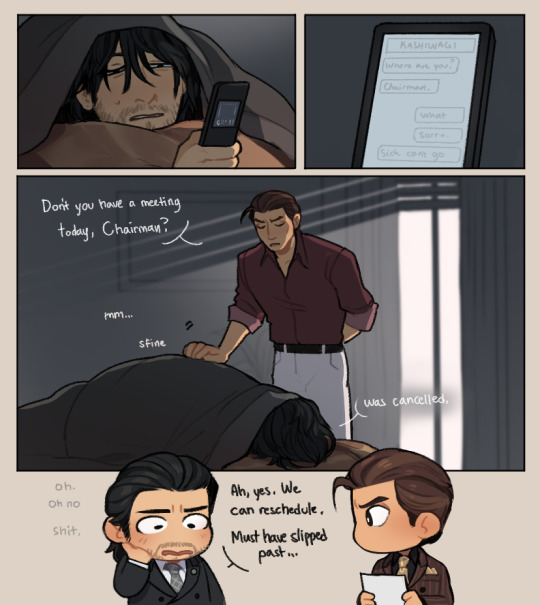
The Chairman will gladly reschedule your meeting. We will reach out to you via email shortly.
#dojima daigo#mine yoshitaka#half asleep defaulting to his edge era behavior#sorry kashiwagi;;; im sick... cough cough#Daigo rolling over and proceeding to forget about any of that
235 notes
·
View notes
Text
Rapidly losing my good faith towards Veilguard as I get deeper into the story and the characters are still so lacking in depth. 15 hours of gameplay and the most interesting character development comes from Lucanis having a demon in him and admitting that people he killed may or may not be innocent depending on who you ask, and yet there is no tangible story impact outside of party banter :/
I guess Solas is also carrying the brunt of the interesting character development with the side quests about his past and Felassan challenging him on whether he’s becoming too extreme—but it is driving me insane that there are two elven companions in the main party who have absolutely nothing to say about the villains of the game being elven gods. Bellara jokes about it and then proceeds to have absolutely no strong feelings about it whatsoever despite her entire life being devoted to studying elven relics and history??? There’s no way around it, that’s just monstrously shitty writing.
Tevinter sucks so bad that I don’t even think I can talk about it. My biggest question is just “where the fuck are the magisters in all this?” I’m supposed to believe that the only capable people in the entire capital city of Thedas’ most powerful nation are a bunch of sewer dwelling freedom fighters who fight the nonexistent slavery problem? Also Neve is completely flat as a character and her backstory barely makes sense. She’s apparently Hardened in my playthrough because I assumed Tevinter could handle its own problems. This has zero discernible effect on her personality, which has gone from “nice” to “nice but with red graphics.”
I’m still having fun with the gameplay and I like the level designs and combat, but the more I play the more sad I feel about how much of previous DA lore I miss. The city elves and Dalish are indistinguishable. There are no Circle Mages or apostates anymore, no Chantry or Templars. No nobles versus commoners. Just these interchangeable bland factions where the representatives’ personality is “nice.”
Lucanis might be my only exception but even then he’s mostly interesting by what can be extracted from his backstory, not by what is shown in the game :/
#veilguard critical#I’m just. sad. i miss unhinged characters like Anders#i think it also isn’t helping that I went from fire emblem into this game#the support chains going from ‘colossal asshole behavior’ as a default starting point and then working up to friendship#is just so starkly different from the complete lack of conflict in dav
19 notes
·
View notes
Text
my seniors have been so quiet all year and it’s been fine cause we’ve had a lot of writing/research to do but I need them to talk to me now so i was hit by a bolt of inspiration two days ago and I made them all tell me their comfort level with sharing aloud, rating themselves on a scale of 1-10. I then averaged the class score and they’re a 4.5. I then told them yesterday we needed to raise the score the tiniest bit. And the 1’s and 2’s didn’t need to be 10’s just maybe 3’s and 4’s. And they tried! They talked more 😭
#it’s sooooo hard because when a class is quiet my default is to assume you hate me#which is so hard because I need a response. which is why I actually can handle a loud raucous class pretty well because it’s just about#holding their attention and redirecting#but when they’re quiet it’s so hard. but i’ve really forced myself to be like ‘they don’t hate you they’re just quiet’#and they ARE#and actually they are reading (not all of them lol) and a lot of them want to learn#it was really helpful going to try to capitalize on this today#I had a moment a few weeks ago where I taught them a poem and it was crickets and I was like sigh they hate it and me#but then I said wanna learn another one? and like—seven of them nodded at me with big eyes and quiet enthusiasm#and I was like okayyyyy there is something going on#it feels so different teaching them than any other class it’s been a real learning experience for me#also yesterday we were talking about Jane Fairfax and Emma hating her lolololol#and Emma being frustrated with Jane’s reserve and I teased them a little bit#I said you’re not cold but you ARE reserved and I am Emma trying to get you to tell me about Frank Churchill at Weymouth#literally lol#ALSO it hit me like a ton of bricks yesterday that this is the class where I need to tell them WHY I make them tell me all the plot details#and we go over it together#and the actual concrete purpose of it. cause it isn’t just book-clubbing it!#it has to do with guiding them through a novel but also teaching them how to do it themselves#I get so prickly when people think it’s just book club behavior#if I was in a book club i would be a tyrant which is why I belong in a classroom#ANYWAY I AM WASTING THE DAY AWAY#but i have woken up with great excitement because I’ve been mulling on the seniors all year#and I feel like I’m getting somewhere#teaching tag
26 notes
·
View notes
Text

day 228
pinned
(timelapse under the cut)
#day 228#year 4#aradia megido#homestuck#AradiaAugust#truly just fucked around w the default pencil for a while on this one#anyway. classic butterfly behavior
154 notes
·
View notes
Text
A slime girl's cellulite feels like orbeez I think. The same applies to slime boys, or slime enbies.
#they would be very nice to squish#squish squish#cellulite is cute methinks#i think people should stop treating the default behavior of body tissues as unnatural#this post is about capitalism#and sexism#tags here#slime girl#slime monster#monster girl#monster gf#monster guy#monster fucker#monster#tw monsterfucking#cellulite
105 notes
·
View notes
Text
AroAce Five is something that can be soooo personal
#like his 'wife' being a coping mechanism for the isolation he's suffered and also kinda based off his mom??? very much what a thirteen year#old views a romantic relationship as#also how she's an extension of himself like???#don't quote ne on this tho I've only watched s1#also this is NOT because he's in a child body fuck that#literally despise how often the 'childish one/youngest' is headcanoned aroace as default#think pidge from vld or luffy from one piece#love aroace luffy but you can tell a lot of people just see him as so because of his behavior#anyways#number five#five hargreeves#tua#the umbrella academy
124 notes
·
View notes
Text
impressive. just looked at the timkon tag on ao3 and not one fic on the front page today is actually about timkon.
#rimi talks#like... i wasnt expecting much from the timkon tag bc it is after all always a hellscape#but wow! the bar was low and yet...#*dont tell me about filters i know how to use filters thats not the point of this observation#the point is that i think its grating when a ship is treated as just the default setting in the background#like you just HAVE to pair them off even if youre not writing about either of them as characters#this is grating behavior to me. broadly pervasive but grating#anyways im mostly just whining bc im having such an awful fatigue day out of the blue and that makes me grumbly#like i CAN filter and i DO use filters but also the fact that the ship tag is So incredibly unusable bc of default treatment is annoying yk
63 notes
·
View notes
Text
speaking of spiders Google.com why is my small baby tarantula being a freak
#She (I have defaulted to she pronouns it is still too young to be sexed) was climbed up onto the side of her vial this morning.#um. Babe. You are a burrowing spider. You are not arboreal. You have a burrow already.#up until this point you have enjoyed your burrow.#why are u on wall.#Is it because of the molt. You left your molt in your burrow and can’t get it out. So now you’re mad about it.#Idk. Tarantula forum is not giving me many answers that would make sense w/ her environment#I will ask my prof tomorrow to get her opinion on why she’s suddenly decided to be arboreal#it could be nothing. I dunno. I’ve never owned a tarantula. Let alone a baby.#But I see change in behavior and usually that means Something. So . Spider prof gets questions tomorrow#clamtalk#bugposting#housecreatures
13 notes
·
View notes
Text
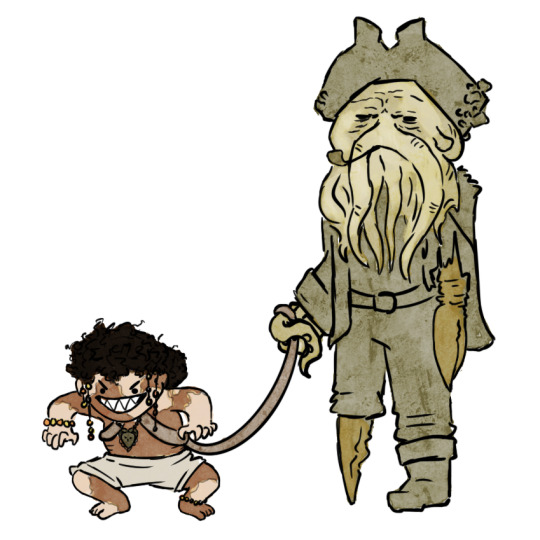
accurate depiction of Davy Jones and his feral toddler’s dynamic in the Dutchman Baby AU
#POTC#pirates of the caribbean#POTC fanart#Davy jones#Dutchman Baby AU#motherless behavior <3#Scylla’s default mode is Bite Things First Ask Questions Later
30 notes
·
View notes
Text
Fun fact but at any given time I’m thinking about how Kaisa is a secretly silly introvert and Johanna is a secretly sad extrovert
#maybe extrovert/introvert wouldn’t be the best words#(I think Jo’s an introvert too probably)#but do you get it???? do you get the vibe?????#like their default behavior doesn’t match their core and they’re always doing what they think people want them to do and be#and they match! THEY MATCH#Kaisa hilda#johanna hilda#sketchbook ship#sketchbook ship hilda
56 notes
·
View notes
Text
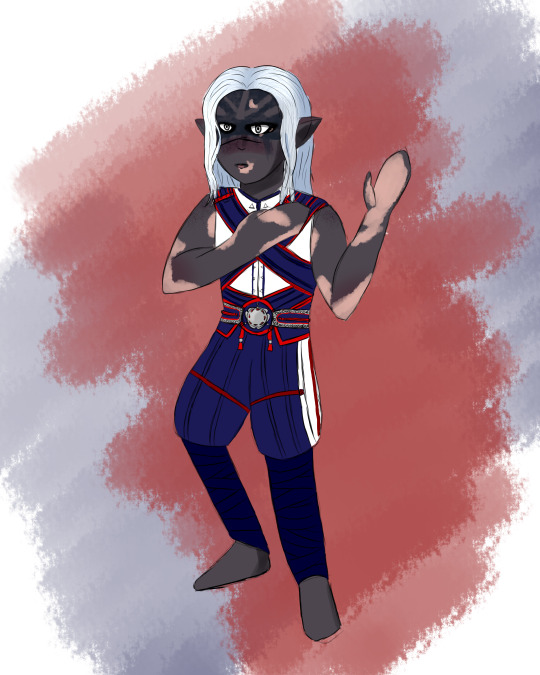
First drawing of Crowdsourced Durge, aka Daggerroot. It's been AWHILE since I last picked up a tablet in proper, but I think this is a decent drawing to start with (also thank you to @too-many-blorbos for helping me with posing)
Details below the cut:
In-game appearance
Crowd-decided details:
I am romancing Gale
This is a Resisting Dark Urge playthrough
They're a middle-aged, nonbinary, deep gnome Way of Shadows monk
On top of their Durge skills (Intimidation/Medicine), they're also proficient in Insight and Stealth
Chaotic Neutral-Good Alignment: Impulsive, acts in the interest of friends only, can be easily persuaded to do the right thing by said friends, but seldom ever the wrong thing. Doesn't care what friends get up to unless it negatively impacts other friends. Strong sense of wanting to rectify past mistakes, but refuses to be told the "correct" way to do so. Thinks stealing from/killing/spiting evil characters is justified because "they deserved it."
Flaws: Blunt/has no filter, contrary for the sake of being contrary, weirdly prejudiced against elves (due to repressed Ketheric spite)
Good Qualities: Loves animals, unfailingly loyal, good at bartering and haggling
Quirks: Takes a trophy from each memorable kill, incredibly horny, will try anything (potions, strange food, licking the spider, Loviatar's blessing) at least once
Memory Loss Side Effects: Thinks everyone else has the Urge but Durge is just bad at controlling it, doesn't know cannibalism isn't normal, doesn't know what sex is
STR 9/DEX 17/CON 12/INT 10/WIS 12/CHA 15
Imposed rule: Short rest after every fight, and long rest when out of short rests
Additional fun facts:
Their name is Daggerroot. They picked their name as they were combing the beach for supplies, recognized a single sprig of it, and the lore around it came to mind: "Known as 'the executioner's garnish', this herb flourishes in blood-fed soil and has flavoured countless final meals." For some reason, the description brought them amusement. Both "Dagger" and "Root" are acceptable nicknames, though most people tend towards the former.
They're the group medic. This is why they're in charge. Because they have such a good medical knowledge due to struck out Dark Urge memories, they've assumed "surgeon" was their profession before being tadpoled. And, I mean, they're not wrong...
There's something just not-quite-right about them, visually. They LOOK a lot like a deep gnome, and to someone who doesn't know deep gnomes well, they are one. But to deep gnomes, they have a very uncanny valley effect to them.
Their dream guardian is identical to them. This is going to do LEAGUES for their trust in this person, with a fair share of existential crises on top of it. "If you're not what's causing the urges...that means I am. I'll listen to whatever you say, because you're clearly my better half."
Monk class backstory:
They killed their foster family as a young child before Sceleritas found them. Because they were out of control then, and now had the eyes of everyone in the Bhaal temple on them, they adopted monastic tendencies (gifted kid + fear)
That deep-seated fear of loss of control still persists in current form Durge (based on the canon origin monologue: "Injured beyond repair, I know nothing besides this: I must resist the Dark Urge, lest is consume my mind.") and leads to sticking with Monk as their class at the start of BG3
Bonus points, they gained admiration from peers in the temple for killing people bare-handed
#why are they barefoot? because they hate shoes#the guardian reveal is going to GUT them#also this ruleset for behavior is going to be fantastic for storycrafting#it is my sincere hope that i have enough spoons to draw dagger more often. and to improve while doing so#there's a hint to their identity in their outfit; i took a tiny bit of liberties#also i gave them bloody plum dye because default does not vibe thank you very much#vitiligo is hard to draw. i need to get better at it. practice makes perfect#bg3#crowdsourced durge#daggerroot durge#the dark urge#also screw hands#i think the next thing I'll practice is expressions. both for the expressions themselves and to practice getting their face right#my art#real coffee hours#holy shit it's 4 am
26 notes
·
View notes